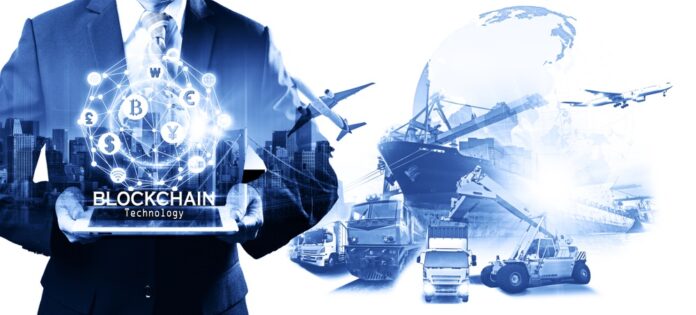The most frequently cited examples of blockchain technology’s potential are cryptocurrencies, but people outside of the financial industry are becoming interested in the technology itself.
From increased security and visibility to tracking complex variables related to sustainability and ethical sourcing, blockchain is poised to help procurement organizations in all sectors lower their costs and improve performance while driving greater value for their companies.
The Blockchain Is Already Transforming Supply Chain Management
The decentralized ledger, which stores and safeguards transaction data shared among numerous stakeholders, is the fundamental component of the blockchain technology. Bitcoin, Ethereum, and Dogecoin are examples of cryptocurrencies that use the blockchain to potentially enable infinite and anonymous parties to conduct transactions without the need for a middleman.
However, the goal of supply chain management is to improve security, guarantee contract compliance, and cut costs while enabling a predetermined number of well-known parties to trade with one another directly. A variety of transaction-related data is “tokenized” by supply chain blockchains instead of actual coins, producing distinctive and easily verifiable IDs for purchase orders, inventory units, bills of lading, etc.
Tokens moving through the network are “signed” by each chain member using their individual digital signature. Since each stakeholder receives a copy of the chain, every step of a given transaction is documented in the transfers between stakeholders, creating an audit trace that cannot be altered. A malicious party altering their own chain would also need to figure out how to alter later links in the versions that everyone else keeps.
Companies utilizing blockchain technology can anticipate the following major advantages:
• Greater Efficiency: A supply chain that uses blockchain technology fosters better cooperation and communication among all parties because it depends on a shared network infrastructure. Increased traceability and openness cut down on waste, double orders, and problems with accounts payable like invoice fraud and rogue spending. Contingencies for contract conformance incentivize all parties to fulfill their contractual commitments on time, completely, and accurately. By lowering uncertainty and risk, full financial transparency improves small company financing options and shortens processing times.
• More Ethical and Sustainable Sourcing: The blockchain’s transparency and tamper-resistance make it simpler to confirm the origin of materials and products, their route through the supply chain, and who had access to them.
• Greater Savings: Blockchain technology offers significant opportunities for cost savings due to productivity improvements and decreases in stock loss and waste. The need for paper-based workflows and materials is also eliminated by a distributed network that shares resources and transactions online. Going paperless reduces expenses not only in terms of materials but also in terms of storage and labor needed to process and maintain all those physical documents.
• Additional Functionality For Other Digital Transformation Technologies: The blockchain easily integrates additional technologies like process automation and Internet of Things (IoT) objects like smart sensors and RFID tags to further increase efficiency, visibility, and accuracy throughout the value chain.
Needed for the Blockchain Project to Succeed
The following factors will help decide whether blockchain is a good fit for a supply chain project:
• Data Exchange: Blockchain is a good option as a solution when data needs to be shared between numerous unrelated parties.
• Trusted Partners: Since blockchain needs updates to be made by numerous unrelated parties, you should feel confident in your ability to trust the project’s partners.
• Shared Value: If the project benefits all partners, they will be motivated to implement the procedures and technology necessary to make it function.
Definition of Data Standards Data accuracy will be maintained by a repeatable, clearly defined process and data standard that all partners can use, ideally with an existing standard like electronic data exchange. (EDI).
• Integrated: For blockchain to be most effective, it should be integrated with the current tech stack, such as an established ERP.
· Cost-benefit comparison You should take into account blockchain-related computational expenses in addition to capital costs. Depending on variables like how quickly they need to be completed, the costs associated with transactions handled through blockchain may be higher or lower. These transactional costs, which are frequently disregarded, will strongly influence whether a project is feasible.
The undertaking is probably not worth pursuing if these components are missing.
Leading Organizations Are Using Blockchain’s Capabilities Already
It is probably still too early for the majority of businesses to think about adopting this emerging technology. However, some businesses across numerous sectors are already utilizing the benefits of the blockchain in their own supply chains:
• FedEx has incorporated the blockchain into its chain of custody to enhance traceability, offer a reliable record, and assist in resolving client disputes.
• DeBeers is utilizing the blockchain’s tracking technology to keep track of the origin and development of each and every natural diamond they mine. The business has also joined the Blockchain in Transport Alliance (BiTA) and is a vocal supporter of the adoption of a blockchain-based industry standard.
• Walmart has taken a serious interest in the blockchain, piloting multiple programs powered by Hyperledger Fabric. The Tracr app helps the company address customer concerns about ethical sourcing of gemstones in addition to improving efficiency and inventory control. The retail behemoth has welcomed leveraging the blockchain to improve supply chain visibility and traceability — and secure more ethical and strategic sourcing possibilities while they’re at it. Examples include tracing the origins of mangoes in the United States and tracking pork sold in its Chinese markets.
Although Bitcoin may have opened the door, the blockchain’s impact on the transformation of the world economy will go beyond money. Blockchain technology has the potential to give supply chains greater visibility and control than ever before. ……………… ………………..



